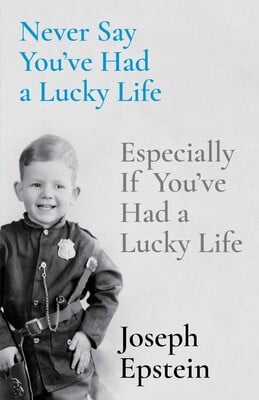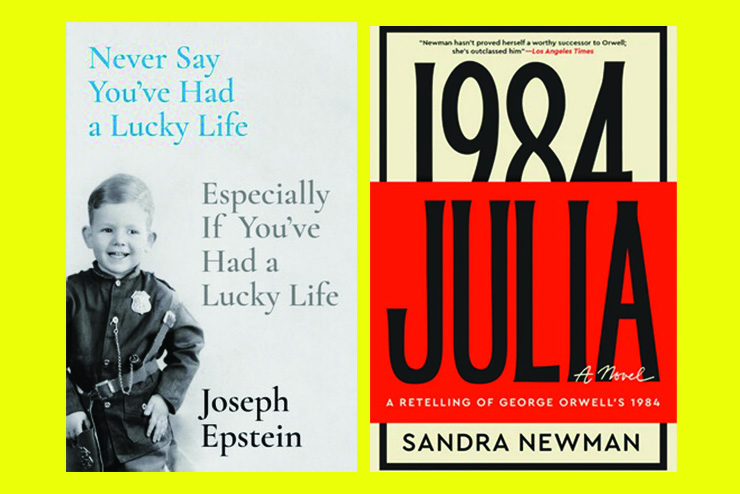
Never Say You’ve Had a Lucky Life: Especially If You’ve Had a Lucky Life, by Joseph Epstein (Simon & Schuster; 304 pp., $29.99). Age has done little to diminish the charm of Epstein’s style, so recognizable for its humorous turns of phrase, frequent allusions to the Partisan Review crowd, and occasional boasts.
From the outset, the 86-year-old makes clear his dissent from George Orwell’s view of autobiographies as “only to be trusted when [they] reveal something disgraceful … since any life when viewed from the inside is simply a series of defeats.” Yet, in his telling, Epstein’s life was clearly not without its tragedies. His career was hardly a linear success; he was frequently passed over for jobs and raises, not to mention being fired as editor of The American Scholar. He endured a painful divorce and lost his youngest child to a drug overdose. In a memorable passage, he describes having sex with a fellow teenager while in high school— and then allowing his civics teacher to do the same with her right after.
But he had his successes, too. He raised two stepsons along with his own biological children while winning numerous book awards. He published no fewer than 30 books, and took pride in being occasionally recognized on the street by fans.
A critic and victim of political correctness and today’s therapeutic culture, Epstein shares Elon Musk’s pride about having never set foot in a psychologist’s office. His father’s cherished advice stayed with him: “Be a man.” No fan of helicopter parenting, he prefers his parents’ “Go out and play” approach. Only one neighborhood father attended his and his friends’ sporting events, and Epstein wonders why the dad had nothing better to do.
Epstein coined and popularized priceless words and phrases such as “virtucrat” and “Irish confetti.” He has a talent for conjuring memorable quips: “As for a ‘man of letters,’ I would have assumed he was someone who worked in a post office,” and, “One meets the most interesting people at bars at ten thirty in the morning.”
Differing from the octogenarian William F. Buckley, Jr.’s famous proclamation to Charlie Rose that he was “tired of life,” Epstein assures us in the final pages that he has lost none of his zeal to go on living. I share his hope that he has a few more years in him—and a few more books.
(Erich J. Prince)

Julia: A Novel, A Retelling of Orwell’s 1984, by Sandra Newman (HarperCollins; 400 pp., $19.99). Julia is George Orwell’s 1984 from the perspective of Winston Smith’s subversive lover, whom he is psychologically tortured into betraying. Newman, a British-educated American novelist of some note whose previous works often deal in alternate realities, wrote this imaginative riff with the permission of the Orwell estate, which holds a copyright on the original 1984 and its characters.
Newman appears to have drawn upon a cornucopia of research, from Alexander Solzhenitsyn, whose admonition to “live not by lies” radiates throughout the novel, to “revisionist” historians of totalitarianism. These sources have argued with varying degrees of plausibility that the technologically enhanced, mid-20th-century totalitarian societies Orwell was trying to warn his readers about when his original novel was published in 1949 were not nearly as powerful or pervasive as early Cold War sensibilities held them to be.
Newman also set out to write in a self-consciously feminist idiom. Indeed, her novel was published a year after the biographer Anna Funder’s Wifedom: Mrs. Orwell’s Invisible Life made a case that Orwell’s first wife, Eileen O’Shaughnessy, was the motive force responsible for much of his success.
As a result, Julia has a much fuller life here. Younger than Winston, whose philosophical meditations on the nature of freedom she privately finds ponderous and dull, she is far more adept at navigating the ins and outs of daily life in Airstrip One. “One has no choice, and yet one must live through it exactly as if one had,” she says.
Unlike Winston, who was mostly raised by the state, Julia’s parents were revolutionaries who fell into disfavor, requiring her to lie and dissimulate with ease while demonstrating outward conformity. She is so convincing that Winston’s original reaction is to hate and fear her as a fully indoctrinated tool of the regime. Instead, as we see hinted at in 1984, Julia has innate creativity, skills as black marketeer, spirited sexuality, and the ability to maintain cognitive dissonance between her contingent loyalty to the party and the indulgence of her predilections and needs.
Julia ultimately fails to keep that balance, but Newman allows her a recovery that leads us to another insight into the 1984 universe. The party is not “forever,” as Winston’s torturer O’Brien proclaims, but deeply troubled. Similar to some historical cases, its imperious posturing as all-knowing and all-seeing masks internecine discord, intractable problems, and even looming defeat. The shattered Winston ends Orwell’s novel accepting what the literary critic Lionel Trilling called “the destruction of a personality” and loving the tyrannical but much propagandized Big Brother. In this obviously ideological but not unentertaining reimagination, Julia accepts a different kind of fate.
(Paul du Quenoy)

Leave a Reply